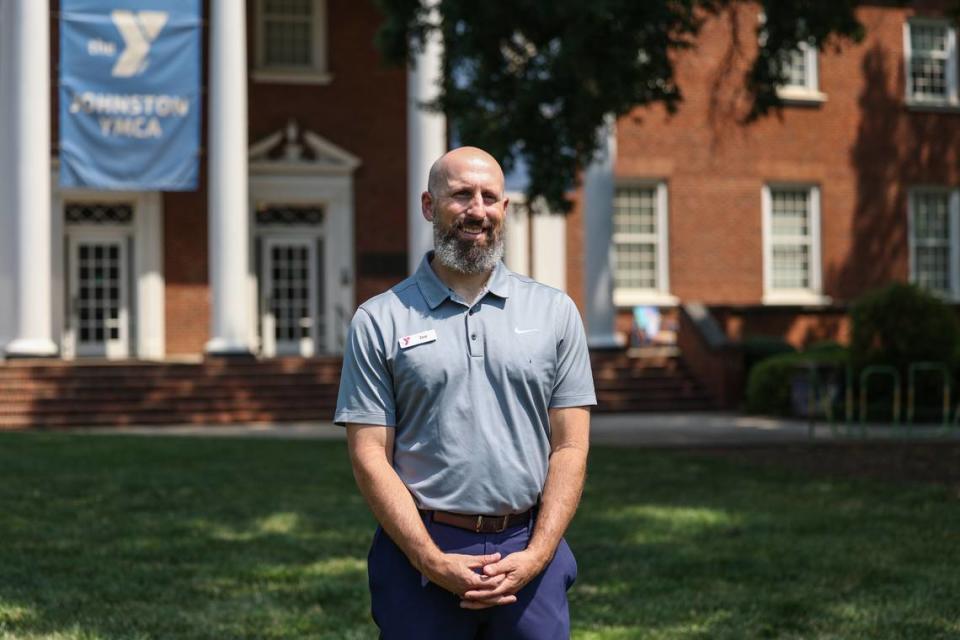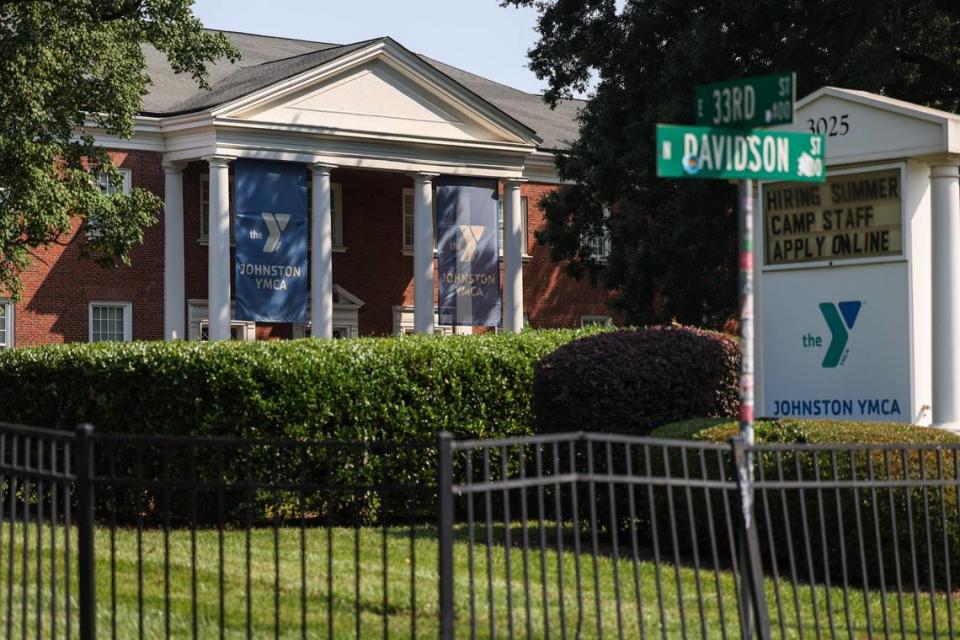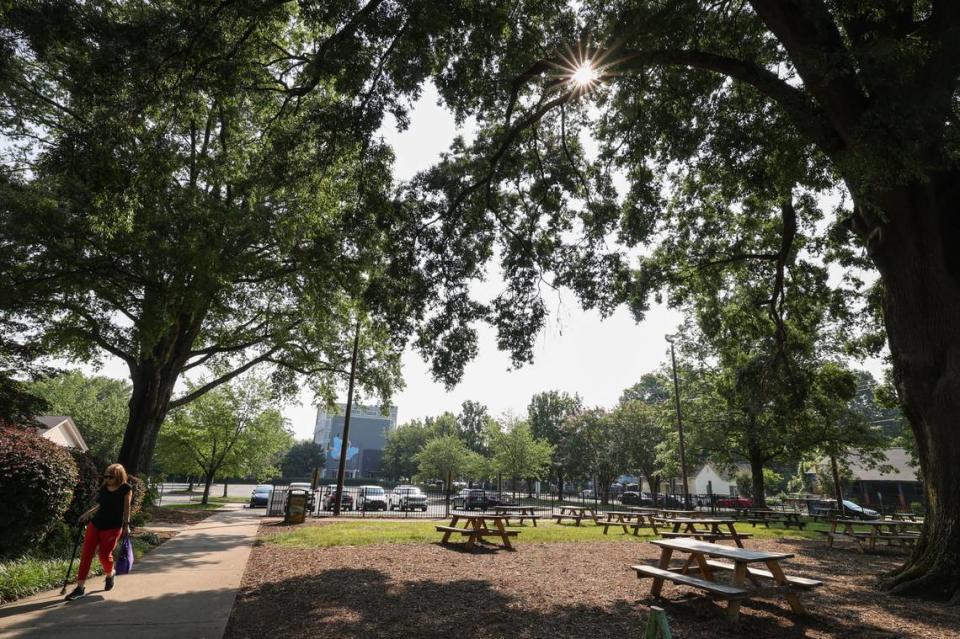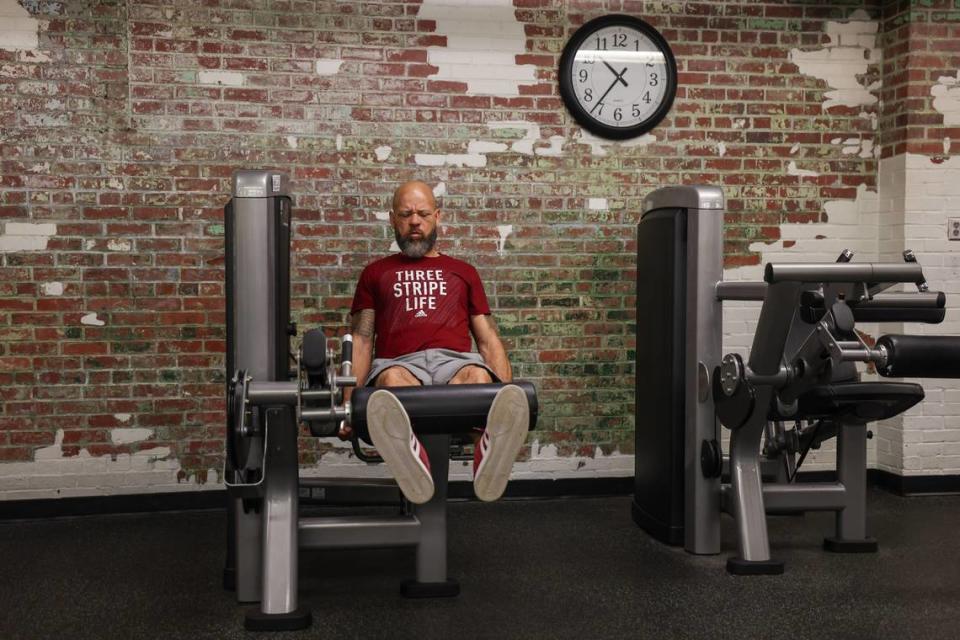NoDa Y sale is symptom of bigger financial problems at Charlotte’s YMCA
No one knows why there are still four working fireplaces in the Johnston YMCA. At one point, of course, they must have heated the 73-year-old building in the heart of NoDa. Now, they’re merely decorative wall ornaments, curious features in the spinning room and yoga studio.
Other oddities are scattered throughout the stately building on North Davidson Street: The lip of a stage sticks out into the gymnasium, but the performance area has long since been sealed off from allowing plays. When the swimming pool area was renovated around 2008, a corridor finally was built to connect it to the main structure — until then, anyone entering the pool had to take a separate side entrance or climb the stairs up from the locker room.
On the whole, the building doesn’t have the glossy, airy look of state-of-the-art workout facilities. Around 2017, the YMCA of Greater Charlotte began to tally a list of many of the quirky features that needed to be updated and modernized.
In May, the YMCA determined the cost to renovate the building combined with the mounting financial losses the system has endured since the pandemic were too much. Instead, the YMCA of Greater Charlotte announced it will sell the Johnston Y property and already has reached an agreement with a developer.
The Johnston branch will close at the end of 2023. County records show that a developer last week filed permits to build phase one of a development called NoDa Village that includes apartments. Clayton Sealey at CLT Development first reported the news.
The property and buildings have an appraised value of $19.4 million, according to county records.
The money from the sale will help the YMCA of Greater Charlotte, but not rescue the nonprofit entirely. According to the YMCA’s tax records, total revenue was down more than 28% from 2019 to 2021, the most recent year for which records are available. Membership today is down about 25% since 2019, YMCA officials said. While it’s slowly rebuilding, no one is sure if it will ever return to pre-pandemic numbers.
What’s more, the YMCA of Greater Charlotte’s president and CEO retired last month, 18 months after assuming the position, citing “stress-related” health issues. The COO, who had spent 20 years with the organization, also announced his departure in June. The turmoil in leadership and finances pose the biggest challenge in decades for an organization that for generations has been one of Charlotte’s most influential and successful nonprofits.
The sale of the Johnston Y building is just one part of a system-wide rebuilding for the YMCA — but one of the most visible elements for a community that has emotional ties to a historic building.
“It’s really unfortunate that the Johnston was a part of that conversation and that’s where we landed with this property,” said Joe Angelon, Charlotte YMCA’s senior vice president of southern operations & special projects. “Without the sale, the YMCA of Greater Charlotte would have to identify some other significant areas that we could change and adjust.
“But it is absolutely necessary — and I wish it wasn’t.”

‘A really stressful time’
When Stan Law was hired to lead the YMCA of Greater Charlotte in January 2022, he touted his family roots in Charlotte that go back more than 100 years, and estimated it would take 12-24 months to rebuild the organization from pandemic losses.
A little more than a year later, Law, 61, told QCity Metro that his June 2 retirement was “100% stress-related.” He said he’d had just three full nights of sleep in the past four months.
Law declined to speak to the Observer for this story.
“I will say I think it’s been a really stressful time for the last several years,” said Charles Bowman, the chair of the YMCA of Greater Charlotte’s Board of Directors.
Some of the causes of stress are easy to identify:
In 2020, thanks to prolonged pandemic closures, program service revenue declined by more than half to $32.7 million from $80 million in 2019.
Total revenue further declined from 2020 to 2021 — going from $78 million to $71.8 million.
Program services (including membership and camps) revenue dropped from accounting for 80% of total revenue in 2019 to 62.9% in 2021.
“It’s simple, but it’s complex,” Bowman said. “It’s simple in terms of the pandemic was a huge shock and unanticipated.”
The pandemic exposed that the YMCA’s heavy reliance on membership for funds was a liability. Before COVID, the YMCA of Greater Charlotte had about 60,000 memberships (membership units can include a family, not just an individual). Post-pandemic, that number fell to 27,000. It’s back up to about 45,000.
“We fell off the cliff,” Bowman said. “But to use that analogy, we’re clawing our way back up.”
The YMCA was kept afloat by a Paycheck Protection Plan loan of $9.6 million used to assist with paying employee wages and benefits, as well as several other COVID-related grants. The organization also received a one-time $18 million donation from billionaire philanthropist MacKenzie Scott in 2020, which accounted for 42% of the YMCA’s $43 million in contributions and grants that year. That money was earmarked for use in programs in Charlotte’s Corridors of Opportunity.
“It may look as though we had cash, but the board asked that not be used for operating expenses,” Bowman said of Scott’s grant.
Bowman is the former Charlotte president at Bank of America who stepped down from his bank position in April 2022. He became board chair at the start of 2022.
At the start of 2023, the board began to meet weekly to discuss ways to rethink its business model. What they settled on was improving four areas: Philanthropy, camping, programs and services, and footprint.
All four are avenues where additional revenue might be generated. For instance: A one-time loyal camper as a child might be willing to donate money now if more outreach is done to locate that person. The YMCA’s two camping facilities can be used as retreat centers year-round with a bit more marketing and upkeep. Programs and services offered at each of the 17 branches can be examined and adjusted so that the most popular ones are duplicated and least-popular ones are discarded.
And the footprint of the organization can be looked at closely to determine which branches are necessary, and whether it might make more sense to sell an asset — such as the Johnston Y.

A need for cash
The decision to sell the Johnston Y property came after the YMCA of Greater Charlotte already had been in exploratory discussions on how best to redevelop the property, Bowman said. The YMCA originally planned to create a neighborhood hub that built on “its historic legacy, creates opportunity for community impact and ensures accessibility for residents of NoDa and the broader north Charlotte community for generations to come.”
The original plan called for the YMCA to “maintain a presence on the site,” the YMCA said.
But that changed after a closer look at the YMCA’s need to balance its ledger.
“Why Johnston? Why not one of the other ones?” Bowman said. “We had an appreciated asset. We had a ready buyer. We were already in negotiations that were almost close to being finalized. And it gave us the biggest opportunity at the time when the need was there.”
Put simply, Bowman said: “The challenge is, you need cash.”
A community hub and a willow oak
Krysten Reilly and her family moved to Charlotte in 2020 and they were immediately drawn to NoDa, where they fell in love with the neighborhood’s walkability, amenities and historic mill houses. Reilly loves the neighborhood so much that she became the NoDa Neighborhood Association’s president this year.
She said one of her first acts as president was to reach out to the YMCA of Greater Charlotte to ask for an update on plans to redevelop the site at 3025 N. Davidson St.
She’s still waiting to hear back.
The neighborhood association had been a part of early redevelopment discussions, the YMCA said, but Reilly contends that no input has been sought in recent years despite her repeated efforts to contact leadership.
That’s why she was so disheartened to learn of the Johnston Y’s sale through a press release.
“What’s frustrating is that they’ve been talking about this for years and they haven’t come to the community to ask, ‘What are the things that we can do at this specific site to make this one successful?’” Reilly said. “That could have been the opportunity to brainstorm some ideas to increase their membership back up post-pandemic and start building back a little bit of a profit.”
The Johnston Y has about 1,500 members, according to YMCA spokesperson Heather Briganti. That’s down from 2,400 in 2019, when the facility was at capacity and had waiting lists. That shift is entirely attributed to behavior changes post-COVID.
“So many people have a Peloton in their house,” Angelon said. “So many people are going to small, boutique fitness centers. They’re not looking for the one-stop-shop membership.”
Angelon said every facet of the programs offered at the Johnston Y suffered post-pandemic: summer camp enrollment is about 235 this year, down from more than 300 pre-pandemic; after-school programming this year had about 30 kids when a full class would be 75-100; a senior program that had 100 members in 2019 had just four return post-pandemic.

But Reilly says losing the Johnston Y will remove a community hub for the NoDa neighborhood. Not only does the building offer fitness facilities — including Charlotte’s oldest indoor pool — and child care, but the expansive front lawn has become an unofficial neighborhood gathering place. The fenced-in grassy area often contains families picnicking and dogs frolicking. It also houses a massive willow oak tree that Reilly is worried about.
The oak reportedly was planted by Horace Johnston around the time the building was constructed in 1950, and its leafy branches stretch the width of the property. Reilly has started an organization called NoDa Tree Save, and has collected about 1,500 signatures on an online petition requesting the YMCA protect the tree.
Bowman says that the fate of the tree is in the hands of the developer.
“We have a contract, and we’ll honor the contract,” he said. “That’s the nature of a private land sale.”
The NoDa Neighborhood and Business Association also contends that because the property and building were a gift to the YMCA from the North Charlotte Foundation, “it is not morally nor logically defensible for the YMCA to sell their gift from the community for maximum profit with zero consideration for the local community.”
“The property was given to the Y to run and manage,” Bowman countered, “and I think we’ve been doing that with fidelity for a long, long, long time. I think we’ve lived up to any of the intents that we honor that community and that property.”

Changes to what makes NoDa special
According to NoDa Neighborhood Association estimates, about 3,500 people currently live in NoDa. Chad Maupin, the board’s vice president, has added up housing developments under construction or planned, and estimates that the neighborhood’s population could increase by 9,000 in the next several years.
“It’s exciting, but I think it also just gives a lot of the people that have lived here pause,” said Reilly, “especially those who have been living here for a lot longer because we want to still hold on to some of those things that make NoDa special.”
The neighborhood once was known for its art galleries and creative flair, and long before that, its textile mill industry. The Johnston branch originally was conceived of as a community center for the mill community. The developer who has agreed to purchase the property has not yet announced detailed plans for it, though permits show another apartment building is coming to an area where such structures are rapidly multiplying.
Angelon, himself, started working at the Johnston branch in 2005, and remembers a time when he could turn right out of the Y’s driveway, run down North Davidson Street, circle back on The Plaza and “I was the only human I would see for 3 miles,” he said. Not anymore.
The neighborhood demographics are shifting as younger residents move into the newly constructed apartments and condos. The YMCA of Greater Charlotte says it still wants to find a way to “serve the community,” but hasn’t yet figured out what that will look like.
“We will come out of this, but we’re at a spot right now, we’re in a transitional phase here,” Angelon said.
The YMCA of Greater Charlotte has begun searching for its next CEO, and Bowman said they’re hopeful to have someone in place by early fall. Next year, the organization celebrates its 150th anniversary. Bowman said the Y intends to exist in Charlotte for another 150 years.
“It will just look different at different times,” he said, “but I think it will definitely continue to serve the people.”


